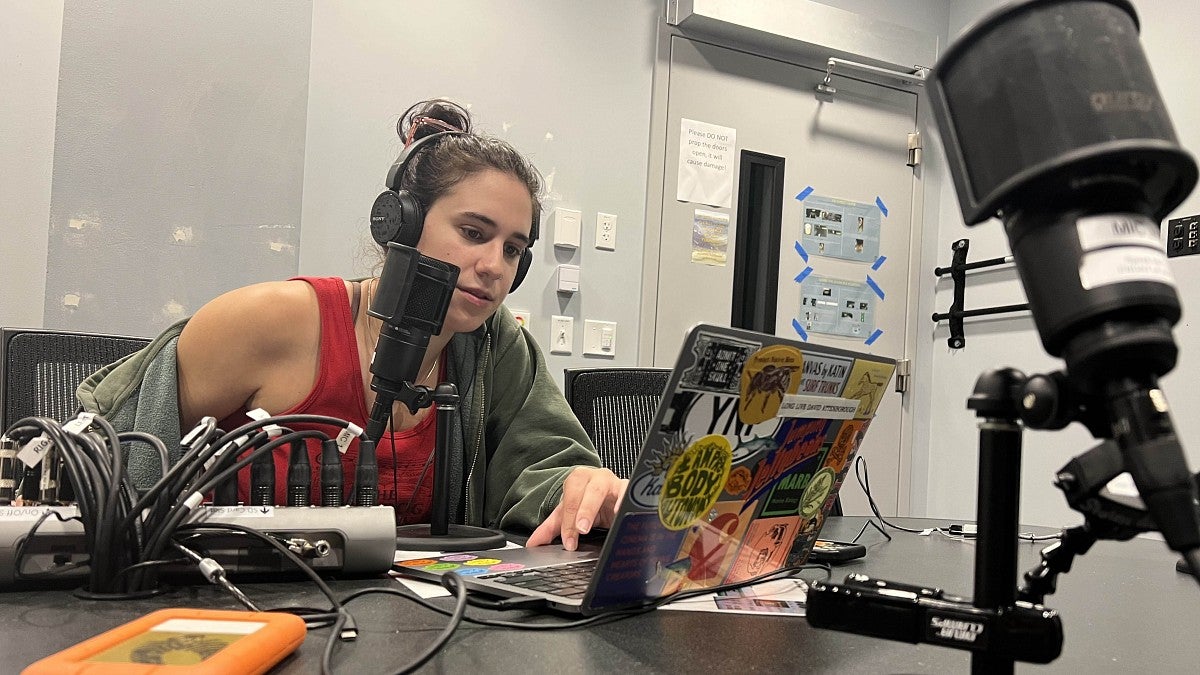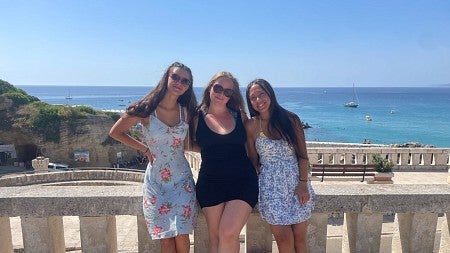
Experiential Learning | Research & Innovation | Community Impact | Career Preparation | Teaching Excellence | 21st Century Liberal Arts | Building Community | Good Vibes | CAS Spotlights | All Stories | Past Issues

Liberal Arts Without Borders
What happens outside of the classroom can be just as important as what happens inside.
Many students at the University of Oregon’s College of Arts and Sciences (CAS) feel driven to extend their studies outside of class, taking advantage of the many hands-on learning opportunities the college offers. CAS spoke with three students in the college who are taking their education abroad, whether it’s studying Italian in a small village, podcasting with marine biologists or gathering research for a doctoral dissertation.
Life in Italy

Audrey Bruce, a global studies major and Italian minor, spent part of her summer in Lecce, Italy. She participated in an intensive Italian language program in a small town in the southeast region of Puglia.
During the program, Bruce says she and the class would do a cultural activity together, such as making pasta by hand and learning the region’s papier-mâché craft. But what she remembers most is studying the traditional folk dance called pizzica.
“In a large open-air courtyard, we first watched as a couple demonstrated the dance,” she recalls. “They then taught us the simple steps, and as a live band of accordions and tambourines played, we all joined in, spinning and clapping and laughing together.”
While in Lecce, Bruce went to class in the town’s historic city center, with breaks in between to grab the region’s specialty caffè Leccese—an iced espresso with almond syrup. While the rest of the town was closed for a “riposo,” a sort of siesta, she would explore the area, often swimming in the Adriatic.
Bruce’s Italian language coursework in CAS's School of Global Studies and Languages prepared her for the intensive program and gave her the cultural context to understand other people, cultures and places.
“Living abroad has pushed me to further develop my self-sufficiency and flexibility,” Bruce says. “I've grown my self-confidence and learned more about myself, all while improving my Italian, making friends and having a lot of fun.”
Podcasting about biology
Eliza Aronson (photo above), a marine biology and journalism double major, has been working in Professor Kelly Sutherland’s marine ecosystems lab to develop a podcast about how marine plankton interact with each other.
“The goal is to explain the different projects being done in the lab while also facilitating a conversation about how scientists actually conduct the science they do, and what makes them passionate about the niche topics they explore,” Aronson says.
Sutherland’s lab is focused on gelatinous plankton, which are key members of marine ecosystems. The lab has students working on the Eugene campus, as well as at the Oregon Institute of Marine Biology in Charleston.
“Classes in both the sciences and communications have helped prepare me for this project,” Aronson says. “I love being immersed in the research that the lab is working on, and the classes I've taken at the Oregon Institute of Marine Biology, such as Invertebrate Zoology, have given me a good foundation to understand the projects that are being worked on.”

Immersion in German literature
German and Scandinavian doctoral candidate Tobias Lehmann participated in the Berlin Seminar, an 11-day program in which he studied trends in contemporary German literature.
While at the seminar, Lehmann and other participants were able to meet with German authors who have written novels about migration, the European Union and identity discourses. Among the authors he met at the seminar were Antje Rávik Strubel, whose latest book Blaue Frau won the 2021 German Book Prize, and Dilek Güngör, who writes about migrant experiences in Germany.
“Güngör not only patiently answered all my questions about the novel but was also willing to talk to me personally afterwards about her work, her life in Germany as an author with a migrant background, and especially about her writing style,” he says. “We also talked about discourses of identity in Germany compared to the US, highlighting some similarities.
On a typical day, Lehmann filled his schedule with conversations over breakfast with other participants, went to discussions with experts, and attended readings by authors and theater productions.
“I left the seminar with a renewed sense of purpose, underscoring my role as a scholar of German literature who researches and writes about German literature and culture,” Lehmann says. “I was inspired to continue reading, researching, writing on my thesis, asking critical and controversial questions, and exploring new academic terrain beneficial for the writing process of my dissertation.”
To attend the seminar in Berlin, Lehmann received support from the Max Kade Foundation and the Professional Developmental Scholarship from the Division of Graduate Studies. He has also received additional support from the German Academic Exchange Service to participate in other conferences. Recently, he presented his research at conferences organized by the German Studies Association in Montreal, Canada, and the Pacific Ancient Modern Language and Literature Association in Portland. He plans to present at the Women in Germany conference in Portland in November.
Lehmann’s dissertation topic is about the representation of one’s home by contemporary East German authors in novels and memoirs. While in Berlin, he says, he spoke with academics, authors and literary critics, which offered him new approaches for his research.
“It was certainly an academic highlight of my career until now,” Lehmann says. “After the pandemic, having very little contact with other German scholars from the US and Germany, it was refreshing to finally have the opportunity to spend time and exchange ideas with others involved in German studies.”
—Henry Houston, MA ’17 (international studies), is a communications coordinator for the College of Arts and Sciences.
